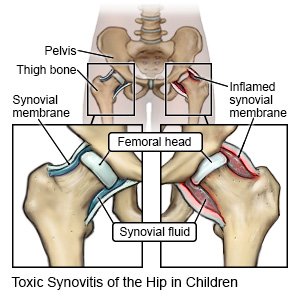Toxic Synovitis of the Hip in Children
Medically reviewed by Drugs.com. Last updated on Apr 6, 2025.
Toxic synovitis of the hip is swelling of your child's hip joint. The swelling usually develops after a viral infection or trauma and does not spread to other areas. Toxic synovitis of the hip can occur at any age but is most common in children 3 to 10 years old.
 |
DISCHARGE INSTRUCTIONS:
Return to the emergency department if:
- Your child's symptoms get worse.
- Your child cannot put any weight on his or her leg.
- Your child's fever is higher than 100ºF (37.8ºC), or as directed by a healthcare provider.
Call your child's doctor if:
- Your child's symptoms do not improve within 3 weeks on their own, or within 2 days with medicine.
- You have questions or concerns about your child's condition or care.
Rest:
Rest and limited leg movement may help your child improve more quickly. Your child may also be told to keep weight off his or her leg until pain decreases.
Medicines:
Your child may need the following:
- Acetaminophen decreases pain and fever. It is available without a doctor's order. Ask how much to give your child and how often to give it. Follow directions. Read the labels of all other medicines your child uses to see if they also contain acetaminophen, or ask your child's doctor or pharmacist. Acetaminophen can cause liver damage if not taken correctly.
- NSAIDs , such as ibuprofen, help decrease swelling, pain, and fever. This medicine is available with or without a doctor's order. NSAIDs can cause stomach bleeding or kidney problems in certain people. If your child takes blood thinner medicine, always ask if NSAIDs are safe for him or her. Always read the medicine label and follow directions. Do not give these medicines to children younger than 6 months without direction from a healthcare provider.
- Prescription pain medicine may be given. Ask your child's healthcare provider how to give this medicine safely. Some prescription pain medicines contain acetaminophen. Do not give your child other medicines that contain acetaminophen without talking to a healthcare provider. Too much acetaminophen may cause liver damage. Prescription pain medicine may cause constipation. Ask your child's provider how to prevent or treat constipation.
- Antibiotics help treat a bacterial infection.
- Do not give aspirin to children younger than 18 years. Your child could develop Reye syndrome if he or she has the flu or a fever and takes aspirin. Reye syndrome can cause life-threatening brain and liver damage. Check your child's medicine labels for aspirin or salicylates.
- Give your child's medicine as directed. Contact your child's healthcare provider if you think the medicine is not working as expected. Tell the provider if your child is allergic to any medicine. Keep a current list of the medicines, vitamins, and herbs your child takes. Include the amounts, and when, how, and why they are taken. Bring the list or the medicines in their containers to follow-up visits. Carry your child's medicine list with you in case of an emergency.
Follow up with your child's doctor within 2 days, or as directed:
Write down your questions so you remember to ask them during your visits.
© Copyright Merative 2025 Information is for End User's use only and may not be sold, redistributed or otherwise used for commercial purposes.
The above information is an educational aid only. It is not intended as medical advice for individual conditions or treatments. Talk to your doctor, nurse or pharmacist before following any medical regimen to see if it is safe and effective for you.
Further information
Always consult your healthcare provider to ensure the information displayed on this page applies to your personal circumstances.
